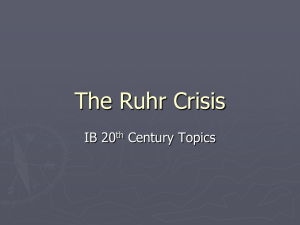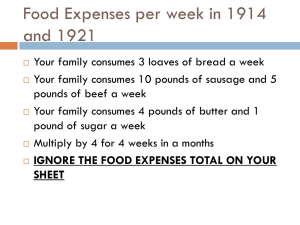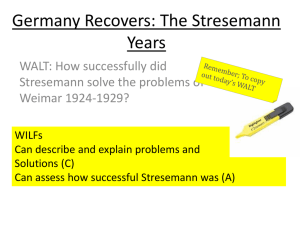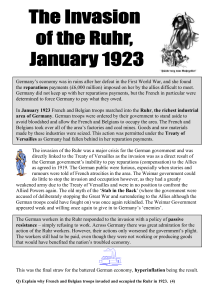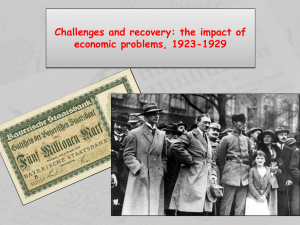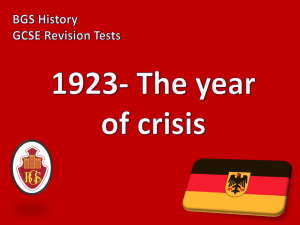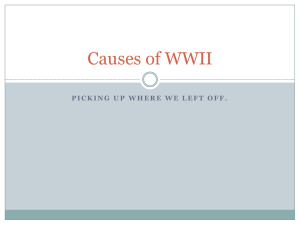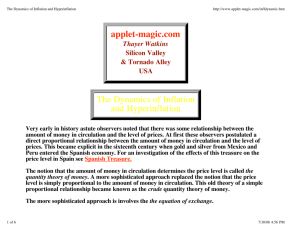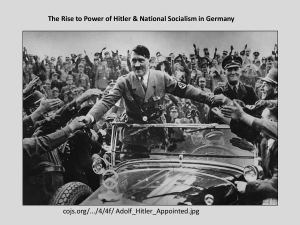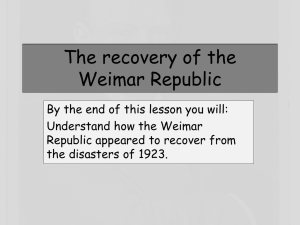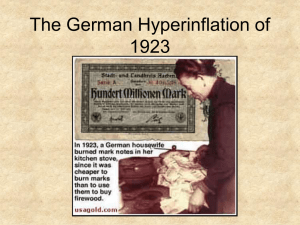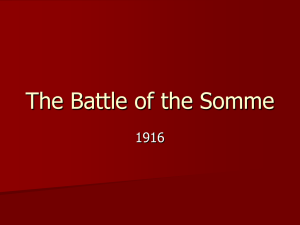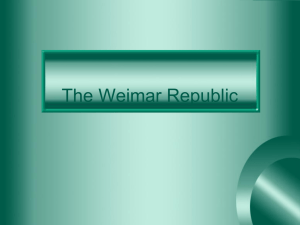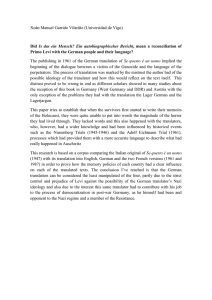LO: To use a primary source to describe the *Hyperinflation* of 1923
advertisement
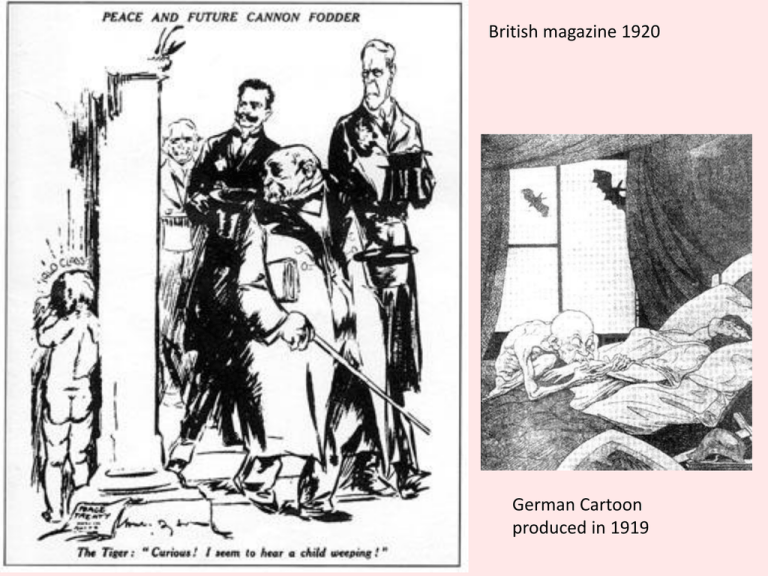
British magazine 1920 German Cartoon produced in 1919 Why did the Treaty cause problems for Germany from 1919-1923? 1. To explain how the Germans reacted to the Peace Treaty 2. To create a chronology of events in order to show the effect of the Versailles Treaty on Germany Task: Read pages 6-10 as a class Then answer! How did German´s feel about the Treaty and why? Use these phrases: Stab in the back / humiliated, Weimar Government German newspaper June 1919 A chronology of problems 1918-1923 Task 1: Create a timeline showing all the problems that occured for the Weimar goverment from signing the Treaty of Versailles. Include details on the following: - Stab in the back - Treaty of Versailles - Spartacists Task 2: - Red rising Which was the - Kapp Putsch worst problem for the Weimar - Munich Putsch government? - Invasion of the Ruhr Why? - Hyperinflation https://www.youtube.com/watch?v=W7xXKT4 u5ZQ TITLE: 1923 The Invasion of the Ruhr and hyperinflation LO: To use primary sources to describe the “Hyperinflation” of 1923 STARTER: Match up the following key words 1. Treaty of Versailles 2. Reparations 3. Weimar Government 4. Proportional Representation 5. Article 48 A) 6.6 billion pounds B) Government between 1919-33 C) The President could make decisions without consulting the Reichstag D) Said Germany could only have an army of 10,000 E) Voting method which resulted in weak coalition Governments 1923 • Germany could no longer repay the reparation repayments • How do you think the French reacted? In pairs what does this poster tell us? The French Occupation of the Ruhr • When the Germans could no longer repay the 6.6 billion pounds in reparation repayments the French were angry • They sent troops to an area called the Ruhr in Germany which was very industrial and produced iron. They then occupied this area to take resources from Germany • Germans in the area went on strike to stop the French getting these resources. This was called “Passive Resistance” • This meant that Germany had even less money as they were not longer making money in this area • Germany had to print more and more money to try and pay the reparation repayments WHY WAS THIS A PROBLEM? Using Source H and your own knowledge explain how hyperinflation in 1923 affected German people (4) Source H: photo taken in 1923 of a woman heating her home by burning money Hyperinflation The more German money that was printed the more worthless it became. Businesses had to increase their prices as money wasn’t worth as much. People could not afford to buy things and became angry with the Government. Hyperinflation – Clip http://www.youtube.com/watch?v=WI1i5yhwOz8 1. 2. 3. 4. 5. 6. 7. 8. 9. 10. 11. 12. 13. 14. Why did Germany owe the Allies money? Where did the French invade? What did the Germans in the Ruhr do? What did the German Government do when it couldn’t pay it’s workers? What did businesses do as the Government printed more money? What happened to wages when the Government printed more money? What is it called when money becomes worthless? How did some people collect their wages? Who suffered the most? How did some people heat their homes? What happened to savings? Who benefited from hyperinflation? What did some people use to buy things? Who did people blame for the situation Hyperinflation – Clip http://www.youtube.com/watch?v=WI1i5yhwOz8 1. 2. 3. 4. 5. 6. 7. 8. 9. 10. 11. 12. 13. 14. Why did Germany owe the Allies money? Where did the French invade? What did the Germans in the Ruhr do? What did the German Government do when it couldn’t pay it’s workers? What did businesses do as the Government printed more money? What happened to wages when the Government printed more money? What is it called when money becomes worthless? How did some people collect their wages? Who suffered the most? How did some people heat their homes? What happened to savings? Who benefited from hyperinflation? What did some people use to buy things? Who did people blame for the situation Around the room there are primary sources. Fill in the table. Write down one fact that each of the sources tells you about hyperinflation in 1923 SOURCE A B C D E F G FACTS ABOUT HYPERINFLATION Source A – A writer remembering the effects of hyperinflation on his father My father sold his business and retired. He was considered a rich man and intended to live on his savings. Due to hyperinflation his savings became worthless and the only way he could stay afloat was by going back to work Source B – A worker in a factory On paydays we went with the factory manager to the bank in a 6 seater car which we filled to the brim with bundles of million mark notes. We drove back without anyone paying attention and when the workers got their wages they didn’t even bother to count the notes. Source C – A business owner I paid my workers in goods. My wife stocked these in our flat; chickens, flour, butter. We bought these in bulk as soon as money was available before it went down in value. Source D – A German writer I went to a café for a coffee and as I went in I noticed the price was 5000 marks – just about what I had in my pocket. I sat down read a paper and drank my coffee and asked for the bill. The bill said 8000 marks. I asked the waiter why and he replied that the value of the mark had dropped. Source E – German woman Me and my friend were carrying a laundry basket full of money. We saw a commotion in the street and put down the basket for a moment and turned our backs. When we turned back the money was untouched but the basket was gone! Source F You often bought things you didn’t want. You’d then start to barter. You’d swap a pair of socks for a shirt, a shirt for a pair of trousers and repeat the process until you had something you wanted. Source G During this time people were very depressed and angry. People were especially angry with the Government who did not seem to be solving the problems. People started to look for alternatives such as extremist parties like the Communists and the Nazis. Using Source H and your own knowledge explain how hyperinflation in 1923 affected German people (4) Source G: photo taken in 1923 of a woman heating her home by burning money Mark Scheme 1-2: Generalised answer. Uses content of source ONLY. 3-4: Good explanation of the content of the source. Gives relevant background knowledge which puts the source in context. Help - think about these questions and use these sentence starters What was hyperinflation in 1923? Why can the woman in the picture not buy wood to heat her home? Why is the woman burning money? What does this tell us about the woman’s living standards? How did this make people feel in Germany… who were they angry with? SENTENCE STARTERS: Source G shows us… This shows us how German people were affected because... German people therefore felt…. Using Source H and your own knowledge explain how hyperinflation in 1923 affected German people (4) Source H shows a woman burning ______________ in 1923. This was when money became __________________ during hyperinflation as the Government printed more money to pay the reparation repayments. This affected people as prices _________ and people could not afford things like food and fire wood (as seen in Source _____) which meant that people were starving and poor. Goods were more valuable than ____________ (this explains why the woman in the source is burning the money instead of wood). This affected people as they were angry and depressed and blamed the _____________________ and started to look for alternatives such as the __________________.
